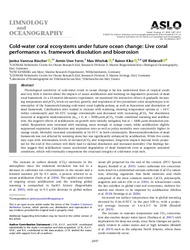Cold‐water coral ecosystems under future ocean change: Live coral performance vs. framework dissolution and bioerosion
DOI: https://doi.org/10.1002/lno.12217
Persistent URL: http://resolver.sub.uni-goettingen.de/purl?gldocs-11858/10393
Persistent URL: http://resolver.sub.uni-goettingen.de/purl?gldocs-11858/10393
Büscher, Janina Vanessa; Form, Armin Uwe; Wisshak, Max; Kiko, Rainer; Riebesell, Ulf, 2022: Cold‐water coral ecosystems under future ocean change: Live coral performance vs. framework dissolution and bioerosion. In: Limnology and Oceanography, Band 67, 11: 2497 - 2515, DOI: 10.1002/lno.12217.
 |
Dokument öffnen: |
Physiological sensitivity of cold‐water corals to ocean change is far less understood than of tropical corals and very little is known about the impacts of ocean acidification and warming on degradative processes of dead coral framework. In a 13‐month laboratory experiment, we examined the interactive effects of gradually increasing temperature and pCO2 levels on survival, growth, and respiration of two prominent color morphotypes (colormorphs) of the framework‐forming cold‐water coral Lophelia pertusa, as well as bioerosion and dissolution of dead framework. Calcification rates tended to increase with warming, showing temperature optima at ~ 14°C (white colormorph) and 10–12°C (orange colormorph) and decreased with increasing pCO2. Net dissolution occurred at aragonite undersaturation (ΩAr < 1) at ~ 1000 μatm pCO2. Under combined warming and acidification, the negative effects of acidification on growth were initially mitigated, but at ~ 1600 μatm dissolution prevailed. Respiration rates increased with warming, more strongly in orange corals, while acidification slightly suppressed respiration. Calcification and respiration rates as well as polyp mortality were consistently higher in orange corals. Mortality increased considerably at 14–15°C in both colormorphs. Bioerosion/dissolution of dead framework was not affected by warming alone but was significantly enhanced by acidification. While live corals may cope with intermediate levels of elevated pCO2 and temperature, long‐term impacts beyond levels projected for the end of this century will likely lead to skeletal dissolution and increased mortality. Our findings further suggest that acidification causes accelerated degradation of dead framework even at aragonite saturated conditions, which will eventually compromise the structural integrity of cold‐water coral reefs.
Statistik:
ZugriffsstatistikSammlung:
This is an open access article under the terms of the Creative Commons Attribution License, which permits use, distribution and reproduction in any medium, provided the original work is properly cited.

